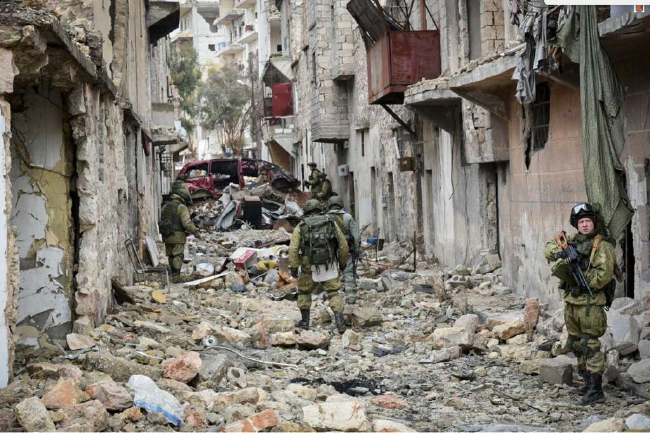The Syria’s conflict, which started in 2011, has changed into a highly perilous game. The rights and liberty of the non-combatants are left at the mercy of militancy and individuals, mainly women and children, burn amidst violence and bloodshed. More than 465,000 people has been reportedly killed, more than a million wounded and over 12 million have been displaced. Within six years of war, however, there has been no outcome. The graph of casualties heightens which increases the sufferings and anguish of the Syrians.
The “Arab Spring”, which led to the downfall of Tunisian President Zine El Abidin Ben Ali and Egyptian President Hosni Mubarak, will be a pyrrhic victory for the Syrian’s freedom fighters. Now the last gleam of hope sparked by the negotiation between the Assad’s regime and Syria’s fighters has been disappeared. Things went downhill with the Tuesday’s deadly attack in the rebel-held Iqlib province, which drew widespread international condemnation. This chemical attack led to large fatalities and outraged the public conscience. Hence, the conflict came to a stalemate and it is really hard to be brokered.
The Free Syrian Army (FSA) was formed on July 2011 after 15 boys were detained and tortured for having written graffiti in support of the Arab Spring with the aim of overthrowing the Assad’s regime. The conflict broke out between Assad’s regime and Syrian Army. The victory of Arab Spring in Tunisia and Egypt sowed the seed of hope in the heart of Syrian’s freedom fighters. Who could predict the indescribable pains and sufferings of the Syrians and the large-scale casualties!
The conflict has become very complicated with the involvement of foreign powers in one hand, and the firm foothold of the self-proclaimed Islamic State of Iraq and the Levant (ISIL) on the other hand. The US-led coalition forces have targeted the ISIL group since 2014. Similarly, Russia launched its military attack against the ISIL and rebel groups on September 2015.
Following the chemical attack, the Donald Trump’s administration has shown strong reaction and reportedly fired 59 Tomahawk cruise missiles at a military airfield in Syria which is the US first direct military action against Syrian government forces in the six-year-old conflict. The attack has been condemned by pro-Assad’s regime and supported by anti-Assad. The strike came despite a warning from Russia of potential “negative consequences” if Washington carried out military action in Syria.
Recently, the Assad’s opposition group lost significant territory and leverage in Syria, for it is fighting both the Syrian government and hardline armed groups including the ISIL and Jabhat Fateh al-Sham (JFS), which will minimize the chance for a peaceful solution.
On Wednesday, Trump had decried the suspected attack – which killed at least 86 people, including 27 children, and wounded more than 500 – as an “affront to humanity”. Taking the oath of office, Trump pledged to eradicate “Islamic terrorism” from the face of the Earth. He vowed to intensify attacks against the ISIL group.
The tragic incidents and heart-wrenching stories make frequent headlines on national and international newspapers and people are affected, all around the globe, by unrest and militancy in one way or another. Despite the claims made by the Universal Declaration of Human Rights (UDHR) after World War II, the sufferings of mankind have not been mitigated. There is a strong sense of fear and disappointment in the public air and the rights and freedoms of all individuals, mainly the women and children, are violated in the worst possible way.
With the escalation of militancy in Syria, the terrorist groups such as ISIL and JFS will fish in the troubled waters and continue their destructive role more confidently. In my previous commentary about the Syria’s issue, I pointed out that terrorist groups will do their best to hamper the peace talks for having no role in this regard. Before the terrorist groups act as whistle blower, the chemical attack left no room for negotiation. No doubt, the unmitigated conflict in Syria will pose great threat to the fundamental rights of the public and also pave grounds for ISIL group to capitalize on the situation.
If worse comes to the worst in Syria, the civilians will bear the brunt of the militancy. The humanitarian law is violated to a great extent by all warring parties. In brief, civilians are highly vulnerable to militancy. At worst, the ISIL group kills men and rapes women on the grounds of their racial and religious backgrounds. The flagrant violation of human rights in Syria is a great cause for concern and must be stopped in some ways.
Foreign countries will have to alleviate the sufferings of the war victims and broker peace talks between the two warring sides in Syria rather than compounding the challenges. Currently, terrorism is a global challenge and counter-insurgency must be the first priority for the world vis-à-vis human rights protection.
It is believed that human crisis is a stain on the collective conscience. The tragic stories of war victims and high graph of civilian casualties put the international instruments and world’s concern, for human rights violation, under question. In brief, the world should not let the Syria’s conflict get worse – it is possible through brokering peace talks and promoting counter-insurgent strategy.

